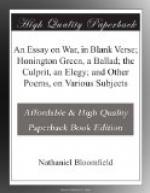The proud City’s gay wealthy train.
Who nought but refinements
adore,
May wonder to hear me complain
That Honington Green is no
more;
But if to the Church you e’er went,
If you knew what the village
has been,
You will sympathize, while I lament
The Enclosure of Honington
Green.
7
That no more upon Honington Green
Dwells the Matron whom most
I revere,
If by pert observation unseen,
I e’en now could indulge
a fond tear.
E’er her bright Morn of Life was
o’ercast,
When my senses first woke
to the scene,
Some short happy hours she had past
On the margin of Honington
Green.
8
Her Parents with Plenty were blest,
And nume’rous her Children,
and young,
Youth’s Blossoms her cheek yet possest,
And Melody woke when she sung:
A Widow so youthful to leave,
(Early clos’d the blest
days he had seen)
My Father was laid in his grave,
In the Church-yard on Honington
Green.
9
I faintly remember the Man,
Who died when I was but a Child;
But far as my young mind could scan,
His manners were gentle and mild:
He won infant ears with his lore,
Nor let young ideas run wild,
Tho’ his hand the severe rod of pow’r
Never sway’d o’er a trembling Child.
10
Not anxiously careful for pelf,
Melancholic and thoughtful, his mind
Look’d inward and dwelt on itself,
Still pensive, pathetic, and kind;
Yet oft in despondency drown’d,
He from friends, and from converse would fly.
In weeping a luxury found,
And reliev’d others’ woes with a sigh.
11
In solitude long would he stay,
And long lock’d in silence his tongue;
Then he humm’d an elegiac lay,
Or a Psalm penitential he sung:
But if with his Friends he regal’d,
His Mirth, as his Griefs, knew no bounds;
In no Tale of Mark Sargent he sail’d,
Nor in all Robin Hood’s Derry-downs.
12
Thro’ the poor Widow’s
long lonely years,
Her Father supported us all:
Yet sure she was loaded with cares,
Being left with six Children so small.
Meagre Want never lifted her latch;
Her cottage was still tight and clean;
And the casement beneath it’s low thatch
Commanded a view o’er the Green.
13
O’er the Green, where so often
she blest
The return of a Husband or Son,
Coming happily home to their rest,
At night, when their labour, was done:
Where so oft in her earlier years,
She, with transport maternal, has seen
(While plying her housewifely cares)
Her Children all safe on the Green.
14
The Green was our pride through the
year,
For in Spring, when the wild flow’rets blew,
Tho’ many rich pastures were near,
Where Cowslips and Daffodils grew;
And tho’ such gallant flow’rs were our
choice,
It was bliss interrupted by Fear—
The Fear of their Owner’s dread voice,
Harshly bawling “You’ve no business
here.”




